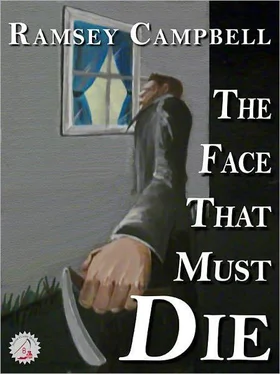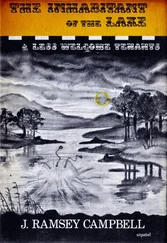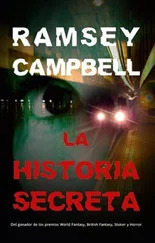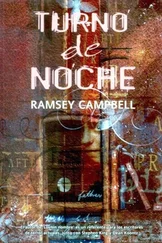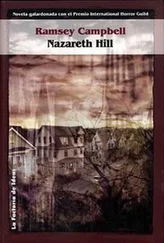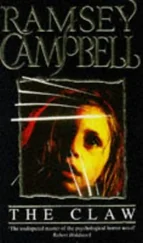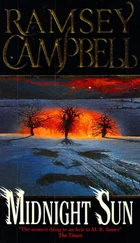Ramsey Campbell - The Face That Must Die
Здесь есть возможность читать онлайн «Ramsey Campbell - The Face That Must Die» весь текст электронной книги совершенно бесплатно (целиком полную версию без сокращений). В некоторых случаях можно слушать аудио, скачать через торрент в формате fb2 и присутствует краткое содержание. Жанр: Триллер, на английском языке. Описание произведения, (предисловие) а так же отзывы посетителей доступны на портале библиотеки ЛибКат.
- Название:The Face That Must Die
- Автор:
- Жанр:
- Год:неизвестен
- ISBN:нет данных
- Рейтинг книги:4 / 5. Голосов: 1
-
Избранное:Добавить в избранное
- Отзывы:
-
Ваша оценка:
- 80
- 1
- 2
- 3
- 4
- 5
The Face That Must Die: краткое содержание, описание и аннотация
Предлагаем к чтению аннотацию, описание, краткое содержание или предисловие (зависит от того, что написал сам автор книги «The Face That Must Die»). Если вы не нашли необходимую информацию о книге — напишите в комментариях, мы постараемся отыскать её.
The Face That Must Die — читать онлайн бесплатно полную книгу (весь текст) целиком
Ниже представлен текст книги, разбитый по страницам. Система сохранения места последней прочитанной страницы, позволяет с удобством читать онлайн бесплатно книгу «The Face That Must Die», без необходимости каждый раз заново искать на чём Вы остановились. Поставьте закладку, и сможете в любой момент перейти на страницу, на которой закончили чтение.
Интервал:
Закладка:
They needn’t think Horridge was a simpleton – not the children, nor the police. He could see more clearly than any of them, including the housewives who trudged home laden with baskets, trying to look burdened as women in the paddy fields: they didn’t impress him.
A face poked forward from the dimness at him. She lived near his flat. He felt as though she’d punched him in the stomach. She must be wondering why he was strolling; he never did so in Cantril Farm. He mustn’t do anything out of the ordinary. Anyone might be watching.
He hurried home. Not too fast! If he passed her, she would observe that too. He watched dimness engulf her. See you on Jan On Jan On Jan Her door clicked shut. Surely it was too dark for anyone else to see him. He ran like an injured child trying to win a game of hide and seek.
As he switched on the light, he saw it: Jan 15. All at once it was vivid, for he remembered how they hadn’t written 15 ^ th – they didn’t sound English. You couldn’t expect her friends to be worth knowing; one of them had been Craig. See you on Jan 15.
He listened to the radio, to hear whether they were in league with the police. Yes, here came the lies: the fictitious Nickelby was the culprit, killing Craig had been too much for him. Let them play their game if it amused them. The news was followed by weather reports. “Heavy rain,” the newsreader said. “Poor visibility.”
Horridge stumbled to his feet and grabbed the radio as though it had begun ticking. He turned up the volume. Had he misheard? The suave voice read the reports; each one received the same careful false inflections. He switched off the set, almost wrenching the knob loose. The man hadn’t been saying “visibility” at all. He had been saying “disability.”
He managed to douse his fury. He’d more important things to think of than their cheap vicious tricks. He must remember everywhere he’d touched. Then he could go in quickly, wipe away his prints, and go straight out. He’d be too quick for the police.
The door and the doorknob. No doubt his prints were mixed with Craig’s. He squirmed, disgusted. Craig and the painter must have had some doubly unnatural relationship. He was too tense to finish his dinner. He scraped half a piece of toast into the bin. Baked beans oozed down the plate, discomforting him.
He’d touched several of her pieces of clay before selecting two. Did clay hold fingerprints? He’d take the pieces away, just in case. She wouldn’t have moved them – she was too untidy. Luck hadn’t deserted him altogether, surely.
He finished the list in his mind. What could he do now until he grew tired? He ought to have borrowed a library book before fleeing. At last he switched on the radio. Perhaps they’d exhausted their tricks for tonight – or could they tell when he was listening?
There was nothing he cared to hear. Radio Merseyside was blaring jazz, Radio City was snarling pop music. Elsewhere was a murder play. Here were bland songs of yesteryear, soothing, reassuring, false. On the station that was meant for serious music was cacophony. Clang! Bong! Ping! It sounded like a herd of savages let loose in an ironmonger’s.
He lay in bed and tried to sleep. He must be wide awake tomorrow. The clock was chanting: See you on Jan, see you on Jan. His mind listed places he must wipe, over and over. Had he forgotten one? The door. The doorknob. The table. The chair in which he’d sat. The cup – he must wipe all the cups, to make sure. The kitchen door and its handles. The tap. The knife with which he’d cut open the clay to receive the keys. The spoons – he’d stirred his tea. Wasn’t listing things supposed to help you sleep? The door. The doorknob. The table.
He slipped the key into the door. It was the right key; as soon as he’d entered the hall he had clenched his fist around the front door’s. The door of the flat refused to budge. He grasped the knob and shoved. He must wipe that last of all.
The door jerked wide. He eased it shut behind him. Apart from its jumble, the flat seemed deserted. A face stared at him from the painting of the art gallery. He ignored it – no time for distractions. He would start in the kitchen and work outwards.
When he opened the kitchen door, the painter was at the sink.
She turned and saw him. Her mouth fell ajar. His hand struggled in his pocket; his documents cascaded out, onto the floor. His birth certificate displayed his name. As she gazed at that, he fumbled open the razor.
When she saw the blade, her mouth gaped. A scream rose in her throat, like the shrill of a train rushing up a tunnel, but it wasn’t quick enough. He slashed her cheek. Her face tore like canvas, and a multicoloured torrent spilled out, drenching him. He was covered with paint sticky as glue.
He woke with a cry that clung to his ears. It frightened him, for it didn’t sound human. What was digging into his neck through the pillow, like a hidden bone? He had to drag himself free of his nightmare before he remembered that it was the razor. He lunged for the switch. The light showed that it was scarcely midnight. The clock raised its voice mockingly. He still had hours to suffer.
Chapter XVII
Fanny was struggling to close her suitcase when she heard footsteps on the front drive.
It had to close. There was nothing she could leave out. She sat on the case, which felt like a hard lumpy bed, and dragged the zip shut while the case was overpowered. Its teeth bit an empty sleeve. Who was on the drive? Just let her deal with the case – if she gave it a respite it would never close. She poked the sleeve back, but a dress emerged from the far end of the case like a soggy Jack-in-the-box. “Get in, fustilugs,” she snarled and, heaving the case to her, flapped the dress into place and thumped herself down on the lid. She closed the case after a loud struggle and rested on it, panting.
She hurried to the window. Nobody was to be seen, even when she lifted the sash and leaned out. It must have been the postman. She went in search of the letters.
Except for shadows, the stairs were deserted. She ought to be less nervous now that Roy’s killer had been caught, but there was a shadow at the foot of the stairs – a blurred version of the strut between the front-door panes, perhaps – which unnerved her. Besides, whoever had sent the police to Roy must still be lurking somewhere in the house.
She sorted the strewn letters on top of the cupboard in which the electricity meters chattered among themselves. She felt an odd pang of apprehension: perhaps there might be a letter for Roy. No – but there was one for her.
It was from a girl she knew at the gallery. She dawdled upstairs, slitting the envelope with her nails. Did they want to know why she’d been avoiding the gallery? The page was obscured by its own shadows. Was she misreading it? Surely – But the brightness in her flat confirmed what she thought she’d read. More than half her paintings had been sold.
She sat beside her case, trying to absorb the news. It was incredible. She could bring down her prices spectacularly now, in order to appeal to the people she wanted to reach.
Didn’t she want to reach those who had bought her work? Her heel tapped a floorboard, urging her to answer, ticking off the seconds she had left. Was there such a thing as a wrong audience for one’s work, or a wrong reason to like it? Perhaps – but, she thought abruptly, it wasn’t up to her to judge. According to the letter, the gallery visitors realised that her name on the paintings was an intentional joke. Few people had before.
She must hurry, or she’d miss her train. She opened the curtains wider, to make sure no burglars thought she was pretending to have gone away. Sunlight gleamed in the detective’s eyes.
Читать дальшеИнтервал:
Закладка:
Похожие книги на «The Face That Must Die»
Представляем Вашему вниманию похожие книги на «The Face That Must Die» списком для выбора. Мы отобрали схожую по названию и смыслу литературу в надежде предоставить читателям больше вариантов отыскать новые, интересные, ещё непрочитанные произведения.
Обсуждение, отзывы о книге «The Face That Must Die» и просто собственные мнения читателей. Оставьте ваши комментарии, напишите, что Вы думаете о произведении, его смысле или главных героях. Укажите что конкретно понравилось, а что нет, и почему Вы так считаете.
